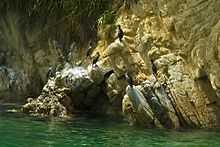Spotted Shag
| Spotted Shag | |
|---|---|
 | |
| Conservation status | |
| Scientific classification | |
| Kingdom: | Animalia |
| Phylum: | Chordata |
| Class: | Aves |
| Order: | Suliformes |
| Family: | Phalacrocoracidae |
| Genus: | Stictocarbo |
| Species: | S. punctatus |
| Binomial name | |
| Stictocarbo punctatus Sparrman, 1786 | |
The Spotted Shag or Parekareka (Phalacrocorax punctatus) is a species of cormorant endemic to New Zealand. Originally classified as Phalacrocorax punctatus, it is sufficiently different in appearance from typical members of that genus that to be for a time placed in a separate genus, Stictocarbo, along with another similar species, the Pitt Shag.
Description

Compared with typical cormorants, the Spotted Shag is a light-coloured bird. Its back is brown. Its belly is pale blue-grey (often appearing white), and the white continues up the sides of the neck and face, but the throat and the top of the head are dark blue-green. In the mating season, it has an obvious double crest. There is little sexual dimorphism.
Spotted Shags feed at sea, often in substantial flocks, taking its prey from mid-water rather than the bottom. It is likely that pilchard and anchovy are important prey species.
Spotted Shags nest in colonies of 10-700 pairs, these colonies are generally found on the ledges of coastal cliffs (see photo at right) or on rocky islets.[2] In the South Island, they are particularly readily observed around Banks Peninsula; there is a large nesting colony immediately south of the city of Christchurch. In Wellington Harbour there is a large colony on a rocky outcrop known as "Shag Rock" just off the south-west end of Matiu/Somes Island.[3] In the Hauraki Gulf there is a breeding colony on Tarahiki Island.
The Spotted Shag was featured on a 60-cent New Zealand postage stamp first issued in 1988, in a series devoted to native birds.
_in_flight_2.jpg)

References
- ↑ BirdLife International (2012). "Phalacrocorax punctatus". IUCN Red List of Threatened Species. Version 2013.2. International Union for Conservation of Nature. Retrieved 26 November 2013.
- ↑ Barrie Heather and Hugh Robertson, "The Field Guide to the Birds of New Zealand" (revised edition), Viking, 2005
- ↑ http://notornis.osnz.org.nz/system/files/Notornis_39_4_263.pdf, accessed on 6 March 2007
External links
| ||||||||||||||||||||||||||||||||||||||||||||||||||||||||||||
| ||||||||||||||||

